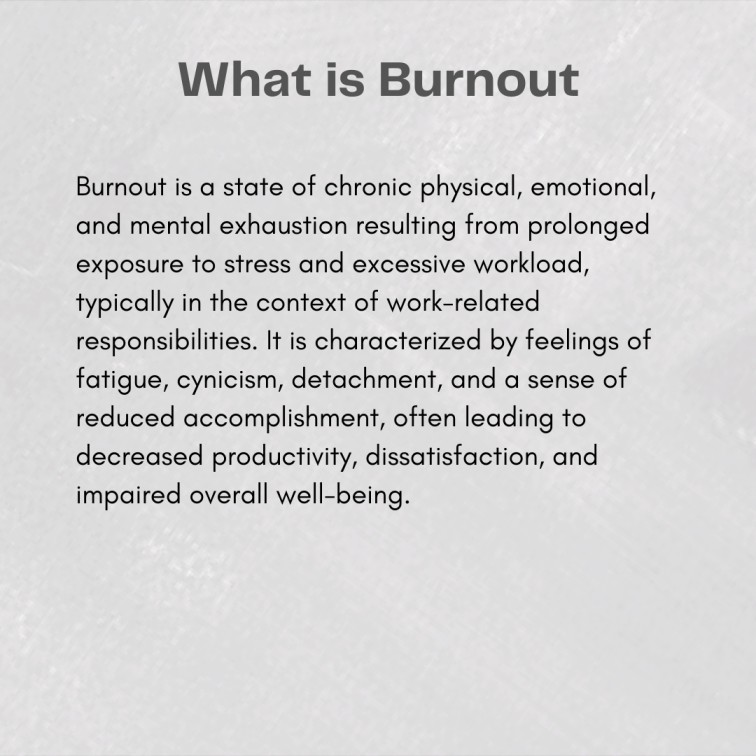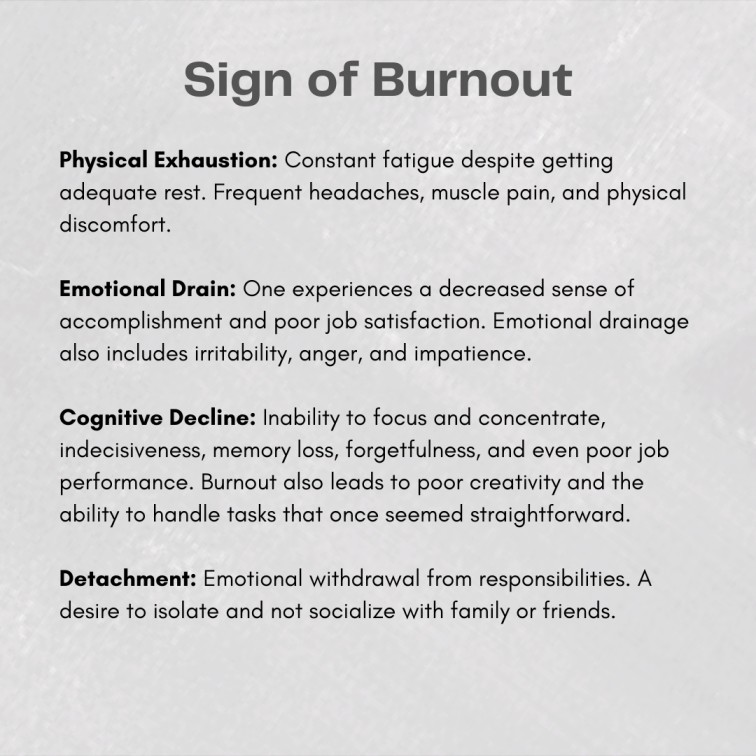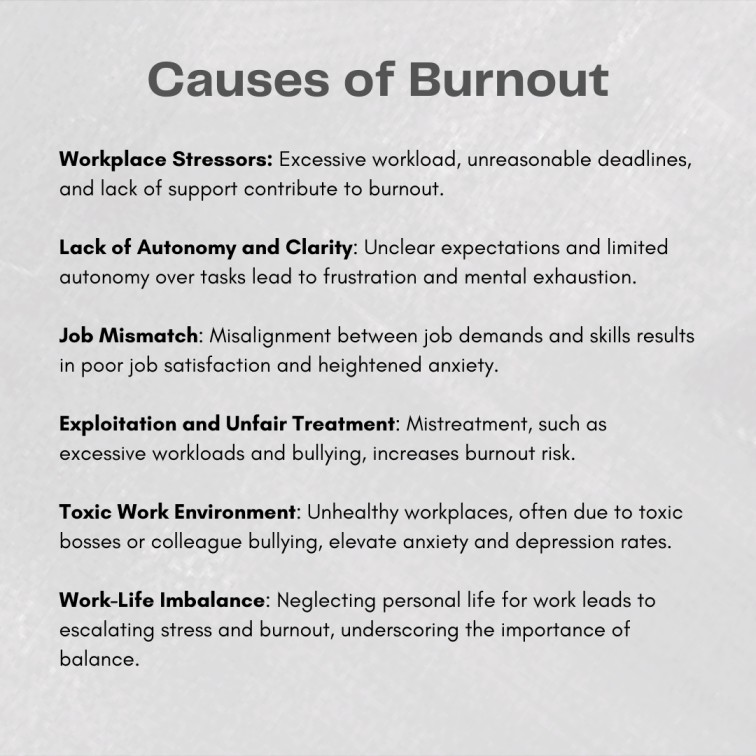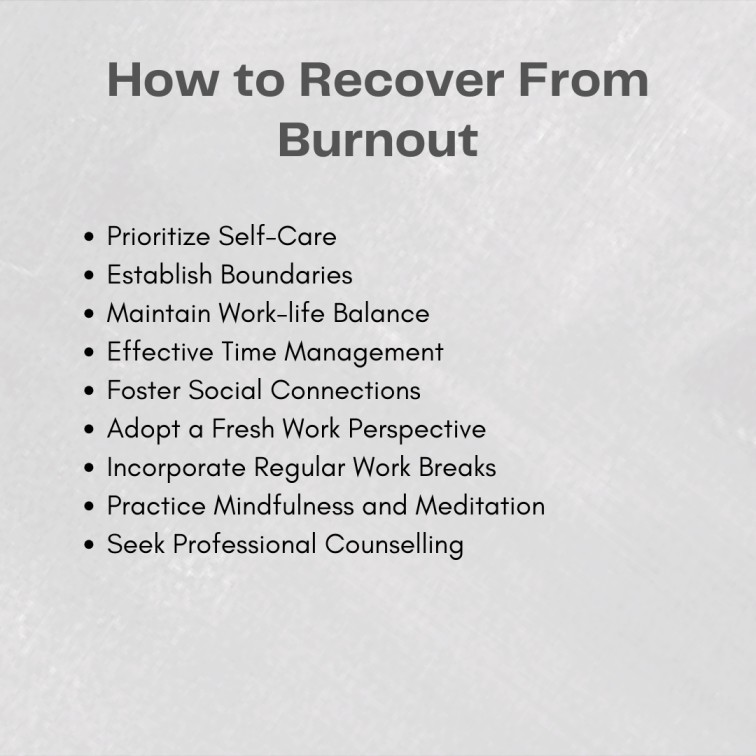Burnout, at some point, is inevitable in a fast-paced world where people constantly strive to balance work, home, and social obligations. It is a lifestyle condition arising from chronic workplace stress that has not been successfully managed, leading to physical, emotional, and mental exhaustion. In some cases, anxiety and depression cannot be ruled out as well. Burnout affects individuals from all walks of life, regardless of profession or background. Understanding the complexities of burnout and its underlying causes is essential for effectively addressing and mitigating its impact on overall well-being.
What is Burnout?
Burnout can occur at some point in your busy life while working and caring for your family. This is because we forget to take some time out for ourselves and rest. Burnout happens to individuals across various professions and walks of life, often accompanied by cynicism and detachment. In most cases, it relates to one’s job, where there is a constant feeling of being swamped with excess stress and mental exhaustion. What follows is a feeling you cannot manage; you feel overwhelmed, emotionally drained, and even lack the will to socialize and keep up with the demands of life. Unfortunately, there is no medical diagnosis for burnout, and if not treated, it can harm your physical and mental wellbeing. Burnout can also compromise immunity and put you at risk of ailments like the flu and cold.
Signs of Burnout
Unlike other health conditions, burnout related to stress occurs gradually over time. It gives you subtle hints and warnings, but these are often ignored and attributed to daily life stressors. The problem is, the longer you ignore these symptoms, the more pronounced the stress until you experience a complete breakdown. Recognizing burnout is the first step toward addressing it where common indicators include:
- Physical Exhaustion: Constant fatigue despite getting adequate rest. Frequent headaches, muscle pain, and physical discomfort.
- Emotional Drain: One experiences a decreased sense of accomplishment and poor job satisfaction. Emotional drainage also includes irritability, anger, and impatience.
- Cognitive Decline: Inability to focus and concentrate, indecisiveness, memory loss, forgetfulness, and even poor job performance. Burnout also leads to poor creativity and the ability to handle tasks that once seemed straightforward.
- Detachment: Emotional withdrawal from responsibilities. A desire to isolate and not socialize with family or friends.
Additional Possible Signs of Burnout
- Gastrointestinal problems
- Hypertension
- Poor immunity
- Fatigue
- Headaches
- Insomnia
- Anxiety and depression
- Worthlessness
- Suicidal ideation
Risk Factors and Causes of Burnout
Only sometimes is a stressful job the reason for burnout; good stress management will not cause such issues. However, some people are at a higher risk of burnout than others. Understanding the root causes of burnout is instrumental in developing targeted strategies for prevention and intervention. While individual experiences may vary, common contributors to burnout include:
- Workplace Stressors: In most cases, excessive workload and unreasonable timing lead to burnout. Adding to that may be the demands of unrealistic deadlines without resources or support from colleagues and supervisors. Employees supported by a manager acquire a psychological buffer against workplace stress and are also 70% less likely to experience burnout. Micromanagement and rigid organizational structures make it difficult for employees to perform.
- Lack of Autonomy and Clarity: In an efficiently run organization, employees know what is expected of them, such as targets and deadlines. But when there is a lack of clarity combined with a lack of autonomy over work tasks, employees begin to get frustrated and mentally drained just trying to figure out what it is they are supposed to do.
- Job Mismatch: A job mismatch could often lead to excessively stressful situations, especially when there is a misalignment between job demands and individual skills. Repetitive and monotonous tasks without intellectual stimulation result in poor job satisfaction, mental stagnation, and anxiety at work.
- Exploitation and Unfair Treatment: Employees who are exploited and mistreated at work are more at risk of experiencing high levels of burnout. Examples of such actions can include intentional workloads, salary cuts, poor compensation, bullying, favoritism, criticism, and comparisons.
- Toxic work environment: Employees in unhealthy working environments are at significant risk of anxiety, depression, and burnout. In most cases, it is the toxic boss responsible, although it could also be cases of bullying by colleagues.
- Work-Life Imbalance: Achieving a balance between work and home is essential because both are equally important. Focusing only on work and neglecting household responsibilities and family problems eventually leads to escalating problems, causing undue stress, anxiety, and burnout.
How to Recover From Burnout
When you experience the signs of burnout, attempting to continue, hoping it will decrease, will only worsen the situation. It requires immediate acknowledgment, remedial measures, and possibly even professional help. Managing burnout requires pressing the pause button on life and adopting a comprehensive approach involving individual and organizational strategies. Here are practical ways to manage burnout effectively:
Self-Care Practices
Regardless of burnout or not, working individuals experiencing work pressure at any level should indulge in self-care. Self-care does not mean just looking good; it is a routine that should cater to your physical, mental, and emotional wellbeing. Prioritize sufficient sleep, balanced nutrition, and regular exercise. In your spare time, engage in activities that bring joy and relaxation.
Set Boundaries and Maintain Work-life Balance
Establishing boundaries is extremely important to achieve a work-life balance. Clearly define work hours and stick to them. Moreover, avoid using electronic devices during non-working hours, especially before sleeping. Focus on the aspects of life that bring you joy and a sense of fulfillment.
Effective Time Management
In most cases, burnout results from poor time management and multitasking that gets nothing done. Break down your tasks and projects by prioritizing them in order of importance. Separating them into manageable segments is a good idea, too. Delegate relevant functions that do not need your expertise and ask for help and support when needed. Time management can also be followed in the case of household chores and organization.
Socialize
While experiencing burnout, everything seems overwhelming and impossible. Life looks bleak, and you feel you cannot muster the energy even to make friends. One of the most positive things to do is to pick yourself up and start socializing. It isn’t necessary to go to parties, but mixing with a small circle of friends and seeking their emotional support certainly helps. Remember, even with just one friend, dating is a natural way to combat stress.
Look at Work From a New Perspective
Whether it’s a monotonous or demanding job, the best way to prevent burnout is not necessarily to quit, but to look for jobs that align with your passions. If a career change isn’t practical, try to find the positive aspects of your current job and the value it brings to your life. Focus on the work, engage in conversations with colleagues, and forge fruitful relationships that help you regain control and improve your state of mind.
Take Regular Breaks During Work Hours
Being a workaholic is only suitable for some. Learn to take breaks from the monotony or pressures of work to refresh the mind. Ensure you are entitled to leave and take a vacation to rejuvenate and recharge yourself.
Mindfulness and Meditation
If you’re facing high stress levels with the risk of burnout, just a few minutes of daily meditation could help calm your mind. Moreover, practice mindfulness to achieve more meaning in life. You’ll be surprised at how the little things in life, including your daily routine of sleeping, working, and eating, can vastly improve your mental wellbeing through mindful living.
Professional Counseling
Professional support is a good idea if you are in a state of burnout and overwhelmed. A therapist can help change your perspective and improve your mental condition through various therapy techniques. Research studies have shown how CBT (cognitive behavioral therapy) can treat burnout. A therapist will focus more on your triggers and stressors to see how best they can remedy your situation.
Burnout can be challenging, but it is not something you cannot remedy. Recognizing the signs and stressors in life can help you create a more stable and balanced mental environment. Prioritizing mental and emotional wellbeing should take precedence to ensure you manage stress efficiently and are never at risk of burnout.




















